A proposal to convert a former funeral parlor into the new home of Temple Beth Or, a Conservative Jewish congregation that has operated in Brick for more than 40 years, was opposed by neighbors who – in the course of a hearing that spanned more than four hours – relayed stories of traffic woes and expressed concern that approving the measure could lead to overcrowding and more congestion in the future.
In the third hearing on the matter, held Wednesday night, representatives from Temple Beth Or reiterated their plan to move their now-small congregation to the former Laurelton Funeral Home site on Pier Avenue, located next door to St. Thomas Lutheran Church and just north of the site where construction on a shopping plaza and sports dome complex is underway. The neighbors contend that their streets have been turned into a cut-through to allow drivers to avoid the congested intersection at Route 70 and Chambers Bridge Road, and adding a religious congregation would only make matters worse. The temple’s professionals, however, testified that members have signed a 20-year lease that would allow them to use the large parking lot of the Lutheran church to avoid the need for on-street parking, as well as the fact that weekend services generally draw only about a dozen worshipers.
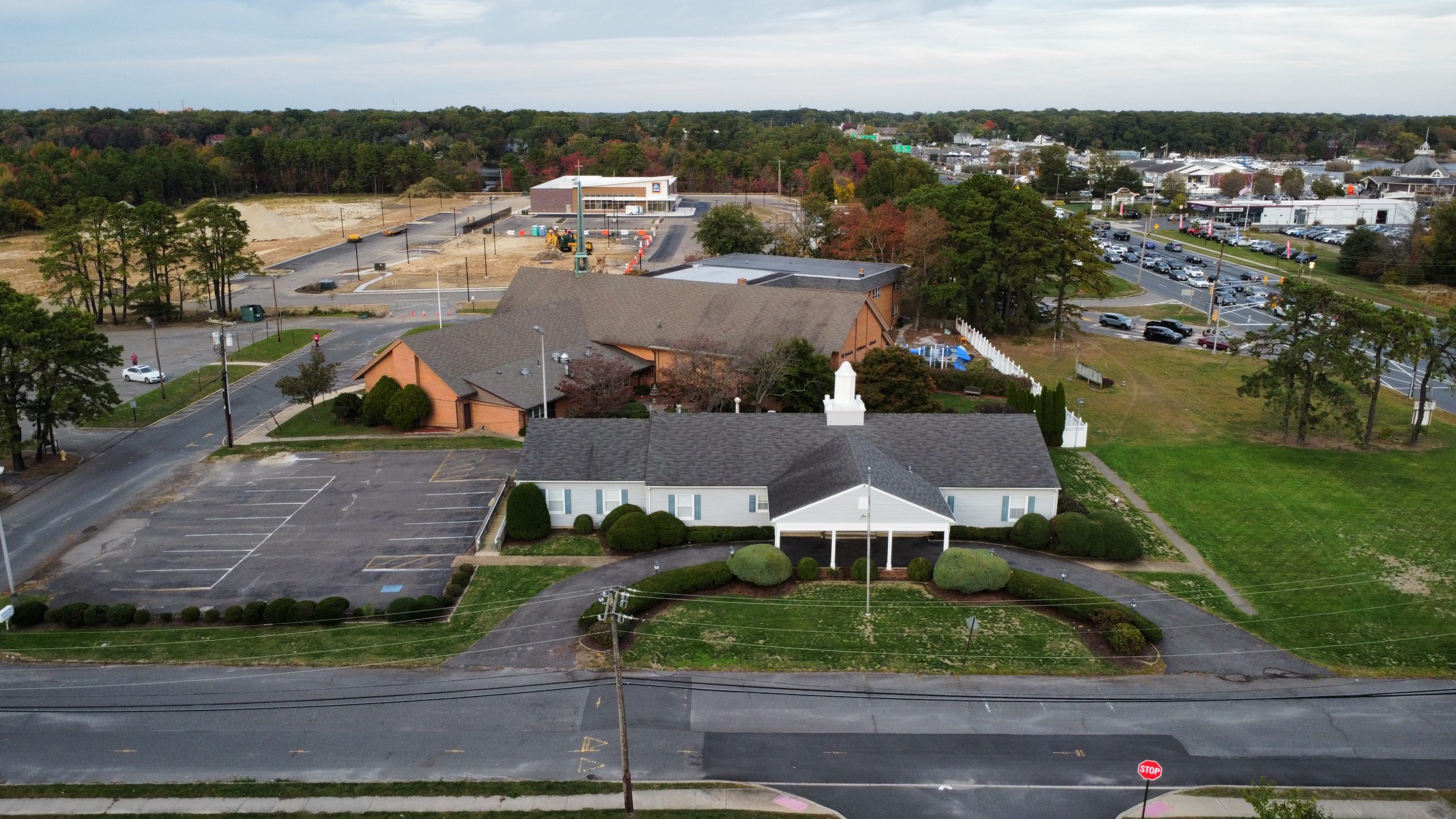
An aerial view of St. Thomas Lutheran Church and the proposed site of Temple Beth Or, Brick, N.J. (Photo: Daniel Nee)
No vote was taken Wednesday, as the length of the meeting eclipsed four hours and by the end of a public hearing, the clock had passed 11 p.m. The required public hearing, which under state land use law consists of a cross examination period and a general comment period, was completed, leading Planning Board Chairman David Chadwick to decide that the board should reconvene in one week to take a vote on the matter, leaving board members a chance to digest the testimony and public comments they heard.
|
|
The discussion, which was occasionally heated but civil in nature, centered on parking and traffic. It began with testimony from two traffic experts – one hired by the temple and one hired by the township – who both conducted counts of temple attendance during recent weekend sabbath services as well as on Yom Kippur, the most major holy day in the Jewish faith. Both experts testified that their counts were within one vehicle of each other. Over the course of two regular weekend services, between 9 and 14 people attended and arrived in 7 to 10 vehicles. On two high holy days, between 45 and 70 people came, arriving in 45 to 55 vehicles. The temple has been hosting its services temporarily in St. Thomas while the matter of occupying their own home is being decided.
“If you look in the Bible, you can see that these patterns are pretty old,” joked Rabbi Robert Rubin.
The township’s traffic consultant, Joseph A. Fishinger, testified that he believes the counts were “typical of a normal Friday or Saturday service” and there “is not any detriment whatsoever” to the community posed by the presence of religious services. Moreover, testimony was already proffered that indicates the use of the building to house a small congregation generates less traffic than its former use as a funeral home.
There are, however, some complications. The funeral home property holds just 13 parking spaces, forcing the temple to rely on the church’s 81-space parking lot.
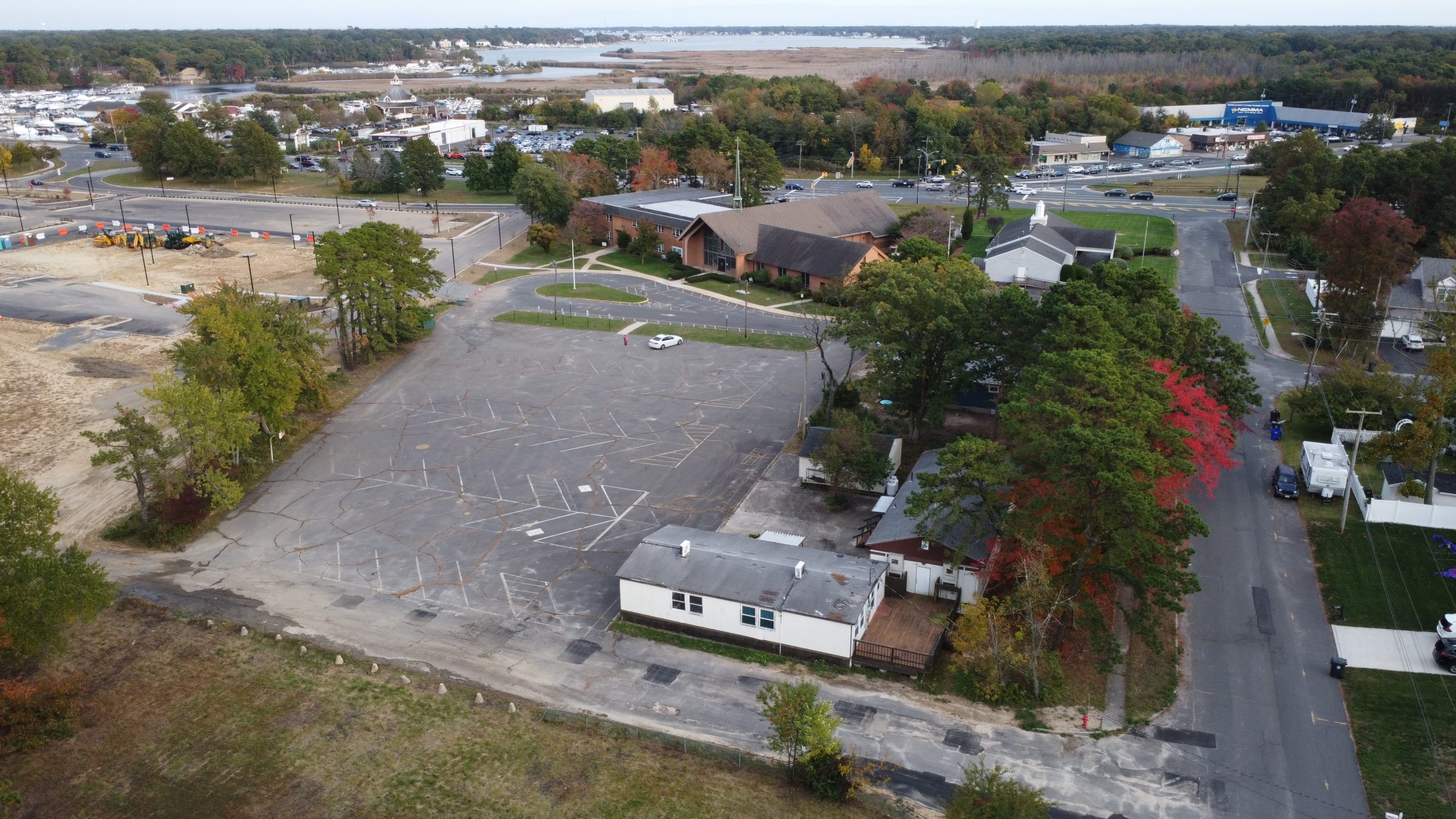
An aerial view of St. Thomas Lutheran Church and the proposed site of Temple Beth Or, Brick, N.J. (Photo: Daniel Nee)
Board Attorney Anne Marie Rizzuto said that while St. Thomas has agreed to file a memorandum of dedication with the county clerk to confirm that the 20-year lease of the parking lot cannot be violated even if the church property were to be sold in the future, such agreements usually require an easement in perpetuity. Rev. John Anderson, pastor of St. Thomas, said the lease could potentially be converted to a 30-year agreement with permission from a higher governing body in the Luthern faith, but the church could not grant an easement in perpetuity due to the fact that such an agreement would bound St. Thomas to offer its parking lot to any entity that one day occupies the funeral home should Temple Beth Or move out.
“Obviously this is an inherently beneficial use” under the law, said Rizzuto. “It has protections both under the Municipal Land Use Law and case law in the state of New Jersey. But more importantly, there is a constitutional right to a freedom of religion. The case law says we can impose reasonable conditions for what we want to accomplish – in this case, it is parking nearby, but off-site.”
The legal doctrine over such use cases is largely based on the 1989 case, Homes of Hope, Inc. v. Mount Holly Township Zoning Board of Adjustment, which dealt with issues of parking related to uses of land which are considered inherently beneficial under the law.
“It would be most preferable to have a document recorded that is permanent in nature,” said Rizzuto. “With that said, we already heard that may not be possible. The board could impose that – and there is case law that allows the board to impose that.”
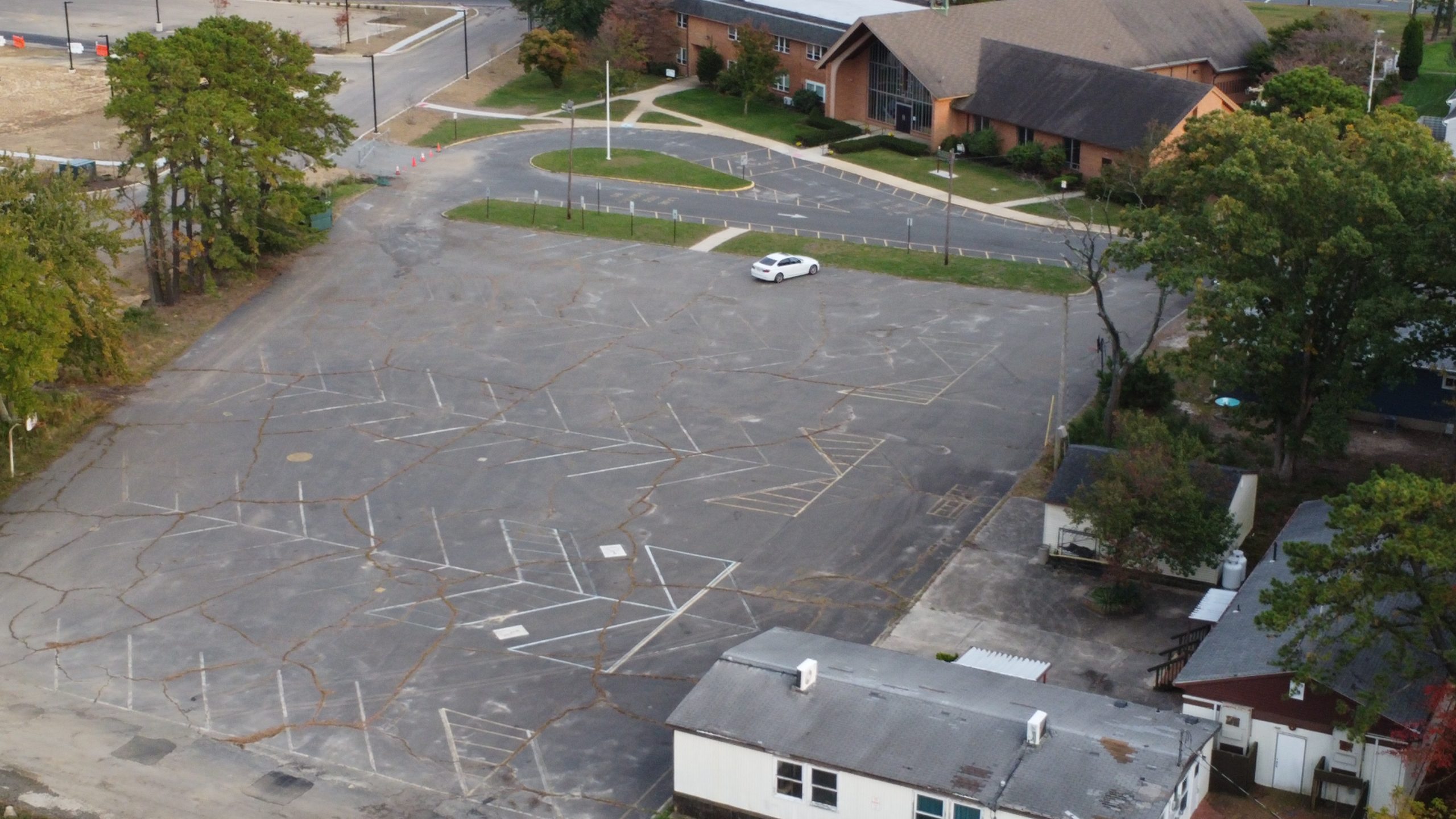
An aerial view of St. Thomas Lutheran Church and the proposed site of Temple Beth Or, Brick, N.J. (Photo: Daniel Nee)
The board would have to find the temple would cause a “substantial detriment” to the community in order to deny the application, given that the use is inherently beneficial.
“I don’t believe, at peak demand, 40 or 50 cars would ever rise to the level of being a substantial detriment,” said attorney John Jackson, representing the temple, given the availability of an 81-space parking lot. “When you look at the formal use as a funeral parlor, there could have been 150 cars there.”
Public Opposition
After some wrangling over clarifications of legal practices and obligations, the board began the public portion of the hearing – the last step before board members would be allowed to vote on the application. Neighbors from several adjacent streets, mainly Pier Avenue and Salmon Street, almost uniformly opposed the application – less with regard to weekend religious services and more prominently with questions over what would occur after the 20-year lease expires, if properties change hands, ancillary uses of the properties (including events, weddings or religious school offerings) or if either the temple or church congregations buck recent trends and begin to grow.
“This has nothing to do with religion for me,” said resident Laurie Sigmon. “My main concern is, I live on Salmon Street. I’ve been there since 1999 and I have watched the township being built up so much between Route 70 and Chambers Bridge. You can’t even cross 70 half the time because it is backed up so much with the traffic.”
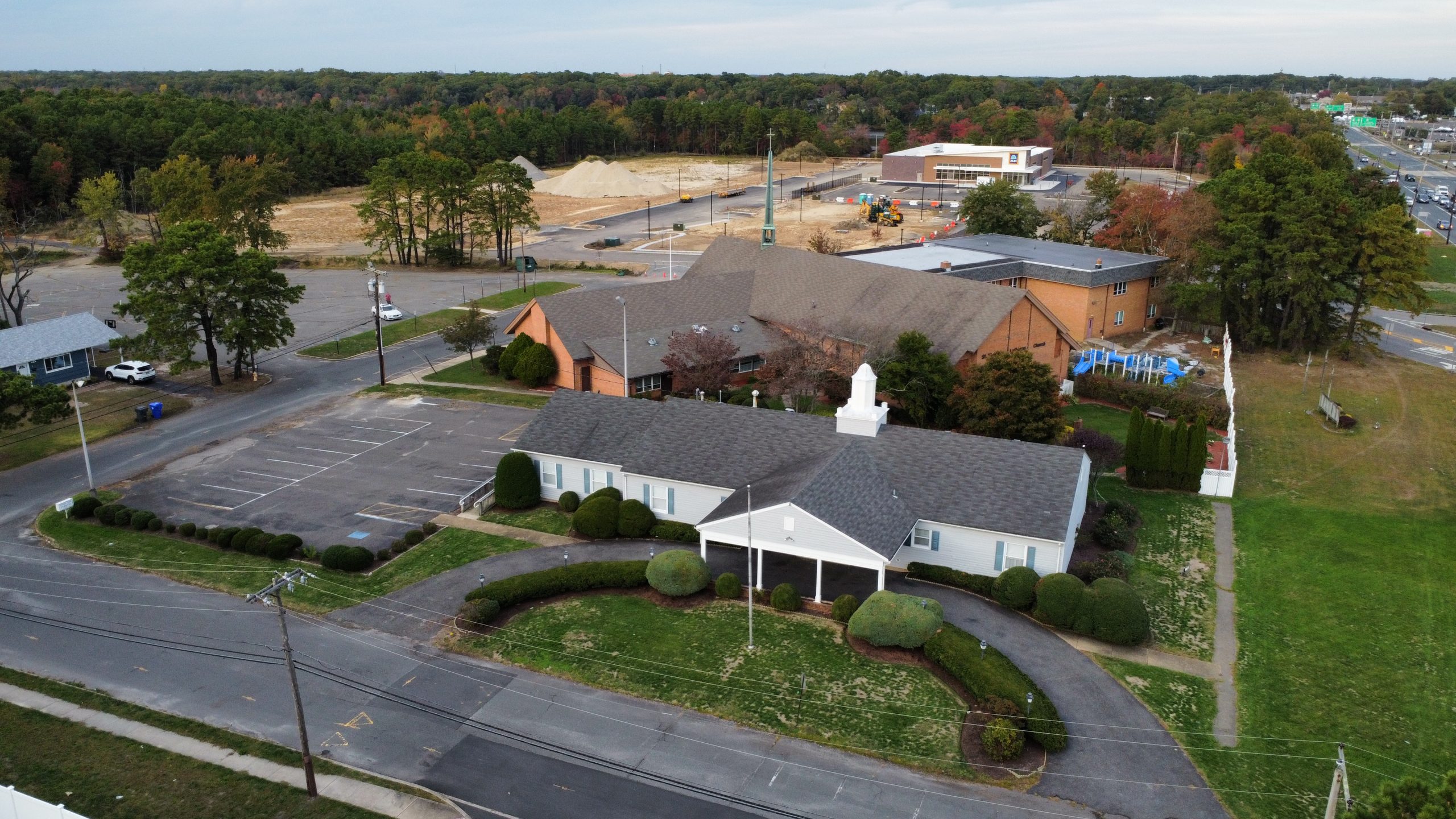
An aerial view of St. Thomas Lutheran Church and the proposed site of Temple Beth Or, Brick, N.J. (Photo: Daniel Nee)
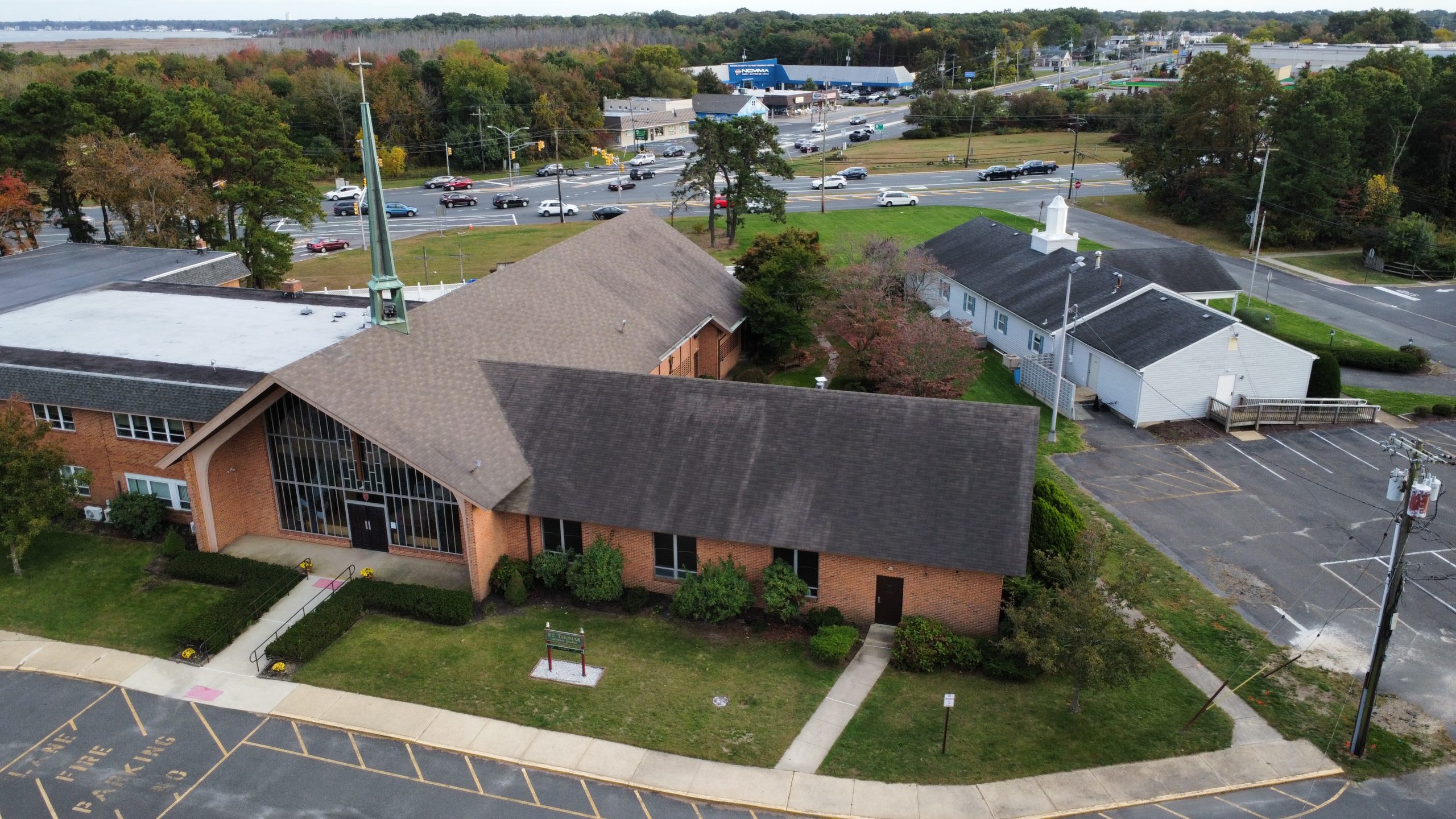
An aerial view of St. Thomas Lutheran Church and the proposed site of Temple Beth Or, Brick, N.J. (Photo: Daniel Nee)
Sigmon said her neighborhood has seen an exponential increase in traffic due to the opening of the Joe Canal’s liquor store, the new Provident Bank branch, combined with an existing 7-Eleven store. A smoothie shop is forthcoming.
Other residents said traffic studies should have been conducted on Salmon Street rather than Pier Avenue, since Salmon Street represents the primary ingress and egress from the neighborhood.
“The issue is our safety – entry into our neighborhood and leaving our neighborhood,” said resident Steve Fife. “There are more families coming together, children coming back home, and they have no place to park.”
Some residents decried speeding cars in the neighborhood, adding that because there are no sidewalks and driveways are used for parking, children often play in the street and set up basketball hoops.
A few members of the temple who spoke said their congregation was small, and no longer operates a religious school or many of the events once typical of a house of worship. Rubin confirmed the temple would not host Bingo nights or gift auctions as they did in their former location on Van Zile Road, both because of a lack of space and a lack of membership.
“These two organizations have worked together in great harmony,” said Robert Horn, a member of St. Thomas. “I’ve seen no increase in traffic. They have been meeting at our church for the past year and-a-half, and nobody from the neighborhood ever mentioned a problem then.”
“We would love to have a congregation of 100, 200 or 300 people – that would be wonderful – but given the age of our congregants, there are, unfortunately, more people passing away than joining,” said Rachel Zycband, a township resident who is a member of Temple Beth Or.
Moving Forward to a Decision
Fishinger, the township’s traffic consultant, testified that under most circumstances, the idea of two houses of worship sharing a parking lot would be an advantage since it utilizes less impervious ground coverage.
“This type of arrangement, where you have two uses that don’t use the parking lot at the same time, is actually beneficial,” he said. “The church and the temple both have their scheduled well in advance. My perspective is that using the shared parking lot is a good idea. There is on-street parking available should it be necessary, but it sounds like the church parking lot is big enough that that won’t be an issue.”
The board’s decision will likely hinge on whether the parking limitations and the lack of a permanent, dedicated parking lot outweigh the criteria in both the Municipal Land Use Law and various state and federal court decisions that provide wide protections for religious land uses.
The zoning board will reconvene Wednesday, Oct. 19 at 7 p.m. at the township municipal complex, where it is expected that board members will take a vote to either approve or deny the application. The meeting is open to the public, however both testimony from witnesses as well as the public hearing on the matter has been concluded.

Advertisement

Police, Fire & Courts
Teacher From Brick, 36, Charged With Carrying on Affair With Student
Brick Life
Adult Autism Transition

Police, Fire & Courts
Teacher From Brick Charged in Another Sex Affair With Student








